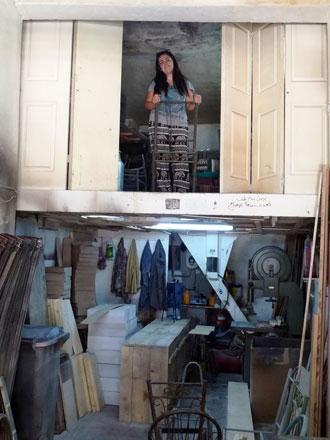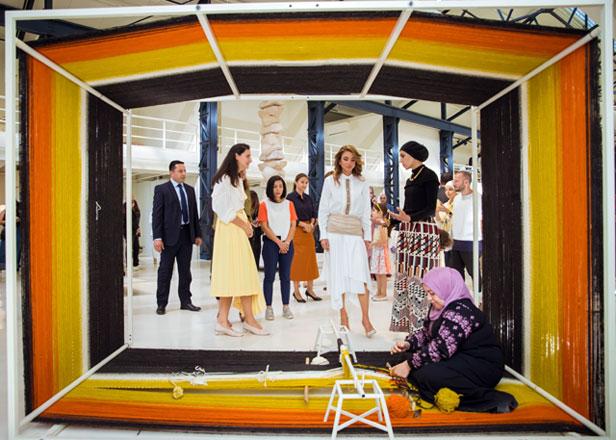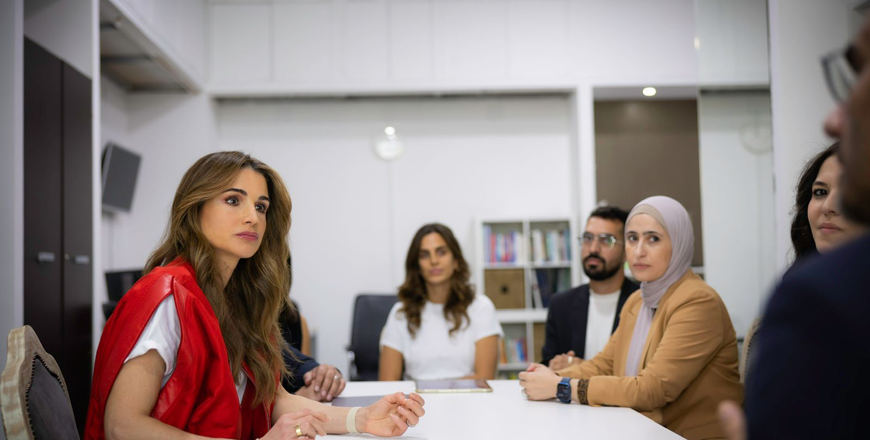You are here
Jordanian woman turns trash to treasure with a green touch
By Perry Keziah - Nov 07,2019 - Last updated at Nov 07,2019

Nour Nsheiwat designs and supplies resturants with up-cycled cooking and serving tools crafted by local artisans from old and abandoned materials and objects (Photo courtesy of Nour Nsheiwat)
AMMAN — What began as an eco-friendly alternative to expensive home decor, turned into an opportunity for a young Jordanian woman to form a business and use her talents to empower artisans around the Kingdom.
In 2018, entrepreneur Nour Nsheiwat established “Hunaya”, an online business that supplies local restaurants with up-cycled cooking and serving tools crafted from old and abandoned materials and objects.
Nour was among the young entrepreneurs from around the Kingdom who met His Majesty King Abdullah on Sunday. During the meeting, His Majesty reaffirmed his keenness to support young Jordanians’ innovative projects, heard from the entrepreneurs and voiced pride in their achievements.
Nour’s Hunaya project began in her own home, she told The Jordan Times in a recent phone interview.
“When my husband and I married… we had to put nice furniture in the house, but the prices in the market were very high,” she said. “[My husband] was working in logistics, and he started bringing me shipping boxes and old things, and we would use them at home.”
As houseguests started to take notice of the unusual furniture pieces and expressed an interest in buying them, Nour and her husband slowly began turning their own innovative, environmentally friendly home decoration project into a small business.
When Nour realised that she could use that same resourcefulness and combine it with her passion for cooking and background in architecture to not only do what she loves, but also serve her community in the process, she founded Hunaya.
Most of the items Hunaya sells, which include salad bowls, utensils, cups and even decor, are designed by Nour herself and crafted by the 15 local artisans she currently employs on a freelance basis, she said.
“I never sell a product that is just artistic,” she said. “I always sell products that have a specific function.”
Besides working directly with artisans through Hunaya, Nour said that she also mentors and guides artisans.
“I do mentorship sessions with students, with artisans, with women who have talents but don’t know how to create an income for themselves,” she said. “I work with them closely through sessions and then we get a product that is ready to sell.”
While many artisans try to sell their products in bazaars, Nour is able to offer them a platform through Hunaya. If a product is successful, she said, she is often able to sell it in large quantities to restaurants, shops and concept stores, among others.
A problem Nour often faces is the “lack of dedication and responsibility” that many artisans feel towards their trade, which she attributed to a lack of training as well as “a general cultural view of craftsmanship”.
“[Many artisans] don’t consider working with their hands to be… a pure profession,” she said.
For Nour, who stressed that she loves working with her hands, the goal is not only to empower artisans by helping them create sustainable revenue streams, but also to transform the narrative around manual work, which is often stigmatised and considered a “lesser” occupation.
“That’s why I have to work with [artisans] in terms of mentorship,” she said, adding that she tries to instil in them a sense of pride and responsibility in their work.
Related Articles
AMMAN — As of Wednesday, refugee artisans from across Jordan have the opportunity to sell their handcrafted products for a week at a shop su
AMMAN — Her Majesty Queen Rania visited Amman Design Week’s (ADW) Ras Al Ain Hangar exhibition in downtown Amman on Wednesday to view the di
AMMAN — Her Majesty Queen Rania visited the offices of the Makesy mobile application in Al Abdali Boulevard on Wednesday, which supports loc













